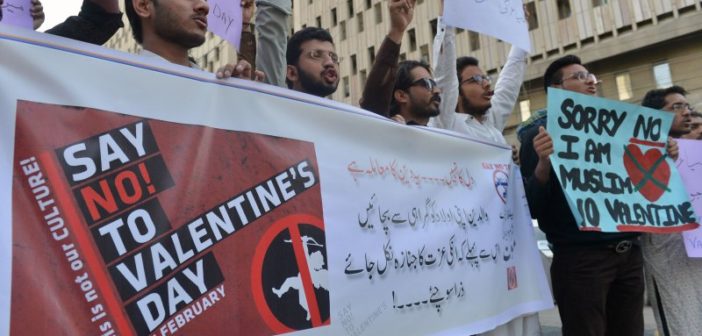By: David Bello Brewer, Contributing Writer
Valentine’s Day has captured the hearts of many people around the world. It is the day that we build the courage to go up to our crush and tell them how we feel through beautiful actions and gifts. A Western Christian holiday, Valentine’s Day, has been culturally chosen as a day to celebrate romance. But what happens when a holiday tradition turns into a cultural war?
Some Muslim countries often push back Valentine’s Day because religious officials say it goes against Islamic Law, calling it a Western custom. Countries that have acted against the feast of Saint Valentine include Malaysia, Indonesia, Pakistan, Iran, Iraq, Saudi Arabia, and many more. In most of these countries, it is taboo to show public displays of affection, so the concept of Valentine’s Day does not match the religious ideologies.
In Pakistan, Valentine’s Day has been an ongoing battle throughout history. Religious conservatives see this day as an opportunity to establish themselves in a crowded space while claiming the title of defenders of the Islamic identity. Pakistan is a Muslim-majority country and it has been subjected to numerous tensions during Valentine’s Day. In 2018, the government banned media coverage of any event related to Valentine’s Day under the Pakistan Electronic Media Regulatory Authority, and a compliance order from the Islamabad High Court.
“No event shall be held at the official level and any public place,” said the Islamabad High Court.
Despite its Western roots, Valentine’s Day impacted a lot of Pakistanis as well as citizens in other countries.
“In my city, Lahore, we celebrate it” said Angeela Sultan, an economics major from Lahore, Pakistan. “Everything is red-themed, restaurants are booked with reservations, and flowers and chocolates are more expensive that day.”

Apples with cloves represent Adam and Eve’s relationship with the apple, symbolizing love, and prosperity. (Photo credit: SAFIN HAMED/AFP via Getty Images)
According to Worldometers, a popular real-time statistics page, more than 60 percent of the population in Pakistan is less than 30 years old. Many young people have adopted the celebration, and premarital dating is becoming more common as global trends impact their traditions.
“My mom doesn’t let me go out on Valentine’s Day because she doesn’t know what could happen,” said Sultan.
Some people think Valentine’s Day promotes public affection and could even lead to premarital sex, while others fear the future of Pakistan by accepting Western traditions. Vendors around the globe are all about Valentine’s Day, and they are embracing it as a chance to promote business.
“We’ve always been inclined to Islam, so people dating before marriage is not allowed,” said Sultan. “I think the reason for the ban is a mix of religion and culture as it’s the really religious people that always protest in the streets.”
The issue is most likely the interpretation of Valentine’s Day. It is seen as something that would lead to sexual intercourse, rather than the promotion of love.
In Iraq, for example, the holiday has not been accepted everywhere, but in some parts of the country, the tradition of celebrating Valentine’s Day has been preserved. In contrast to violence and war around the country, Valentine’s Day has become a day to remind people that there is still hope.
“Valentine’s is celebrated and welcomed more by the younger generation,” says Assistant Professor of Computer Science & Information Systems, Dr. Marwan Omar, who is originally from the small town of Khansor in northern Iraq. “If you have a girlfriend, you can’t really celebrate it unless she’s your fiancé due to the social aspects being different.”

Sellers will usually use lookouts to see if authorities are monitoring the areas on Valentine’s Day patrol. (Photo credit: Aamir Qureshi/AFP via Getty Images)
“Iraq is different from some of the other neighboring countries,” Dr. Omar stated. “We have more ethnicities, so Iraq is more liberal, and we adopt more of the Western things.”
Valentine’s Day brings out the more generous side of the world. It is beautiful to see how people who dreamed of a better future are adopting red as a symbol of love, and not as the violence that has affected their homes. The new generation is already embracing the change, and the power of love is overcoming the love of power.





